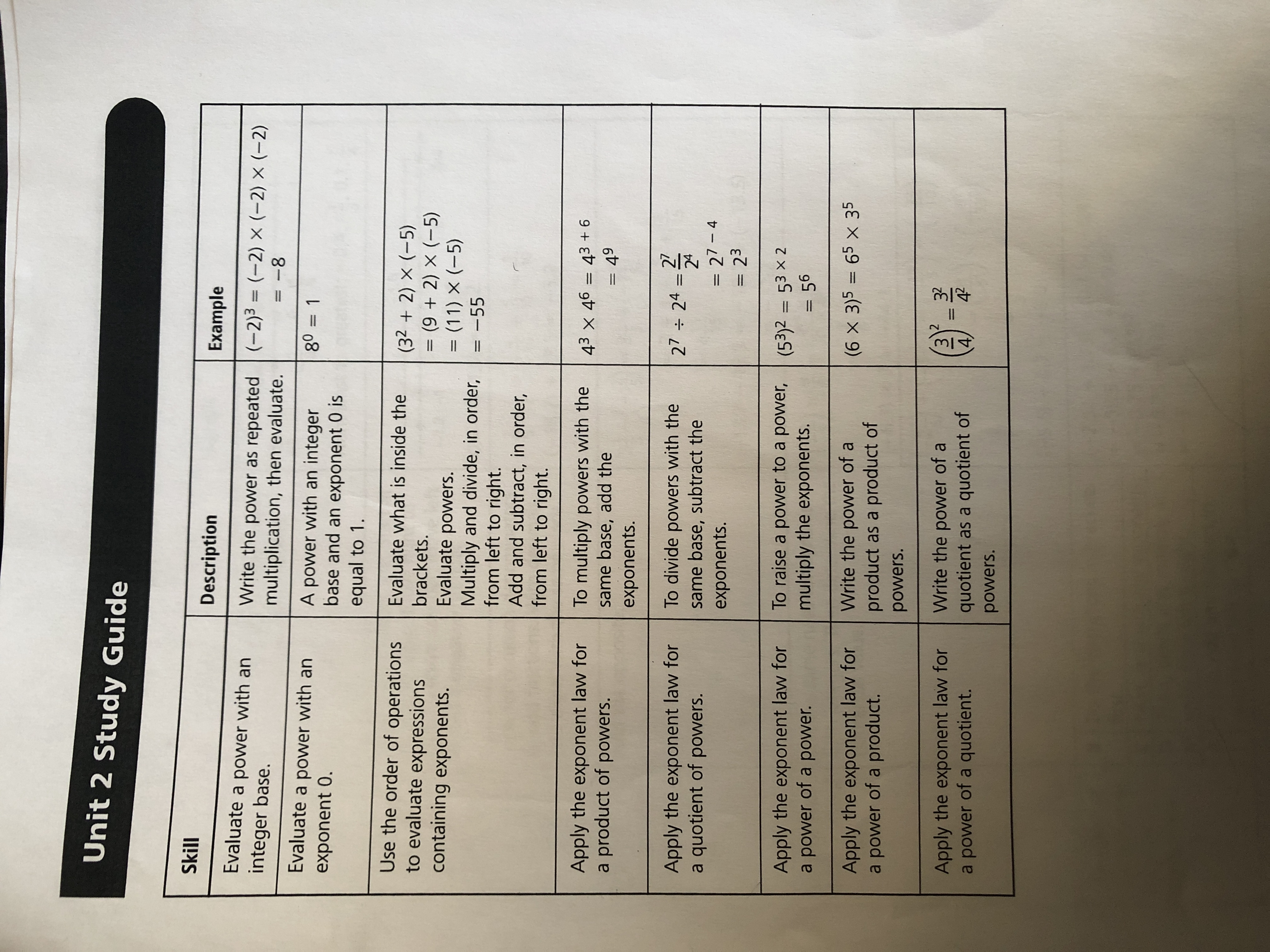Evaluate a power with an integer base and apply the exponent laws as shown in the provided study guide.

Understand the Problem
The question is asking for the evaluation of powers and the application of exponent laws as illustrated in the table, detailing various skills and their corresponding examples.
Answer
The evaluations yield: 1. $(-2)^3 = -8$ 2. $80^0 = 1$ 3. $-170$ 4. $43^{9}$ 5. $27^3$ 6. $5^6$ 7. $6^5 \times 3^5$ 8. $\frac{3^2}{4^2}$
Answer for screen readers
- $(-2)^3 = -8$
- $80^0 = 1$
- $(32 + 2) \times (-5) = -170$
- $43^{9}$
- $27^3$
- $(5^3)^2 = 5^6$
- $(6 \times 3)^5 = 6^5 \times 3^5$
- $(\frac{3}{4})^2 = \frac{3^2}{4^2}$
Steps to Solve
-
Evaluate the power with an integer base
For the power $(-2)^3$, writing it as repeated multiplication gives:
$$(-2)^3 = (-2) \times (-2) \times (-2)$$ -
Calculate the multiplication
Now, let's first multiply $(-2) \times (-2)$
$$(-2) \times (-2) = 4$$
Next, multiply this result with $(-2)$:
$$4 \times (-2) = -8$$ -
Confirm complete calculation
The full calculation shows that $(-2)^3 = -8$. -
Evaluate with exponent 0
Next, for $80^0$, we know that any integer base raised to the power of $0$ is $1$:
$$80^0 = 1$$ -
Use order of operations
For the example $((32 + 2) \times (-5))$, first, evaluate inside the brackets:
$$32 + 2 = 34$$
Now, perform the multiplication:
$$34 \times (-5) = -170$$ -
Simplifying Powers
Next, for the power of a product $43 \times 46$, apply the exponent law for a product of powers:
$$43 \times 46 = 43^{3+6} = 43^9$$ -
Division of Powers
For instance, applying the exponent law for a quotient of powers, evaluate:
$$27^7 \div 27^4 = 27^{7-4} = 27^3$$ -
Raising Powers
To raise a power to a power, using $(5^3)^2$:
Multiply the exponents:
$$5^{3 \times 2} = 5^6$$ -
Product of Powers
For $(6 \times 3)^5$, write it as:
$$(6)^5 \times (3)^5$$ -
Quotient of Powers
For $$(\frac{3}{4})^2$$, write it as a quotient of powers:
$$\frac{3^2}{4^2}$$
- $(-2)^3 = -8$
- $80^0 = 1$
- $(32 + 2) \times (-5) = -170$
- $43^{9}$
- $27^3$
- $(5^3)^2 = 5^6$
- $(6 \times 3)^5 = 6^5 \times 3^5$
- $(\frac{3}{4})^2 = \frac{3^2}{4^2}$
More Information
The guided steps illustrate the workings of exponent laws which simplify complex expressions, revealing how straightforward evaluation leads to understanding. The importance of order of operations also emphasizes correct calculation paths.
Tips
- Forgetting to apply the correct order of operations can lead to wrong answers; always solve parentheses, then powers, and proceed with multiplication and addition/subtraction from left to right.
- Confusing the laws of exponents (like multiplication of powers vs. division of powers) can result in incorrect expressions.
AI-generated content may contain errors. Please verify critical information